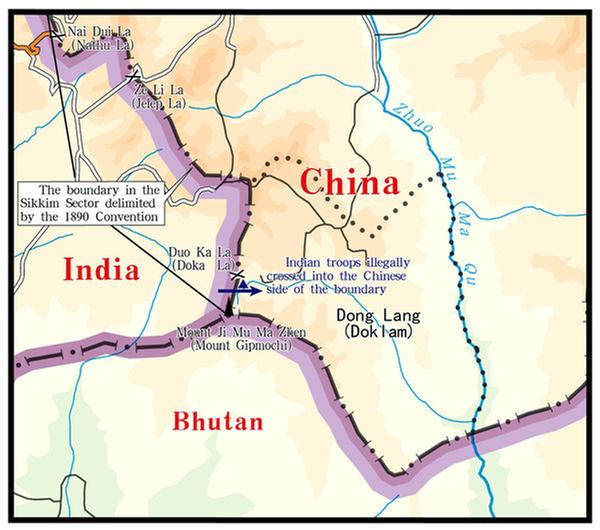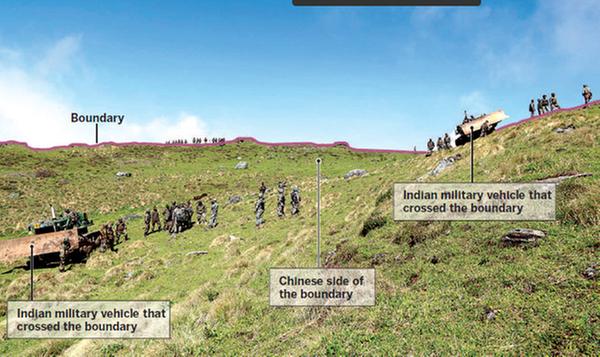Ministry document shows border violations
By WANG QINGYUN | China Daily | Updated: 2017-08-03 05:23

India's trespass across the China-India boundary in the Sikkim Sector and into the Dong Lang area (Doklam) is a severe violation to China's territory and integrity, and its behavior "cannot be tolerated by any sovereign state", Foreign Ministry spokesman Geng Shuang said on Wednesday.
Earlier in the day, the ministry issued a paper giving details of the incursion and rebuking India's excuses for the move.
On June 18, more than 270 armed Indian border troops and two bulldozers crossed the boundary in the Sikkim Sector at the Duo Ka La (Doka La) pass and advanced more than 100 meters into Chinese territory to obstruct road building of the Chinese side, the paper shows.
Geng said the Indian troops remain illegally in China's territory, and India, "instead of taking effective measures to correct its wrongdoing, has fabricated excuses for the illegal trespass by concocting various ungrounded reasons."
China has repeatedly pointed out that India's trespass violates the 1890 Convention Between Great Britain and China Relating to Sikkim and Tibet, which delineates the China-India boundary in the Sikkim Sector. According to the convention, the Dong Lang area (Doklam) is on the Chinese side of the boundary.
The area, located in Yadong county of the Tibet autonomous region, "has all along been part of China and under China's continuous and effective jurisdiction", the Foreign Ministry said in the paper. "There is no dispute in this regard."
Indian border troops have "obstructed the normal patrols along the boundary by Chinese border troops, and attempted to build military installations across the boundary" in recent years, the ministry said.
"The fact of the matter is it is India that has attempted time and again to change the status quo of the China-India boundary in the Sikkim Sector, which poses a grave security threat to China," it said.
|

|
| A Foreign Ministry photo released on Wednesday shows Indian troops encroaching on Chinese territory. Provided to China Daily |
The ministry also rebuked the notion that the incursion took place at the boundary tri-junction between China, India and Bhutan, saying it occurred "more than 2,000 meters away from Mount Ji Mu Ma Zhen" and thus has nothing to do with the tri-junction.
According to the 1890 convention, the mountain is the eastern starting point of the China-India boundary in the Sikkim Sector and the boundary tri-junction of the three countries.
"It (India) has no right to unilaterally alter the delimited boundary and its eastern starting point, still less should it violate China's territorial sovereignty on the basis of its untenable arguments," the ministry said.
Urging India to withdraw troops "immediately and unconditionally", the ministry said, "China will take all necessary measures to safeguard its legitimate and lawful rights and interests."
Geng said China issued the paper to further explain what really happened and elaborate on the Chinese government's position.
"China did this to safeguard its territory and sovereignty, the basic principles of international law and the basic norms of international relations, as well as justice," he said. "China believes that the right cannot be wronged, and justice will prevail."
wangqingyun@chinadaily.com.cn
























